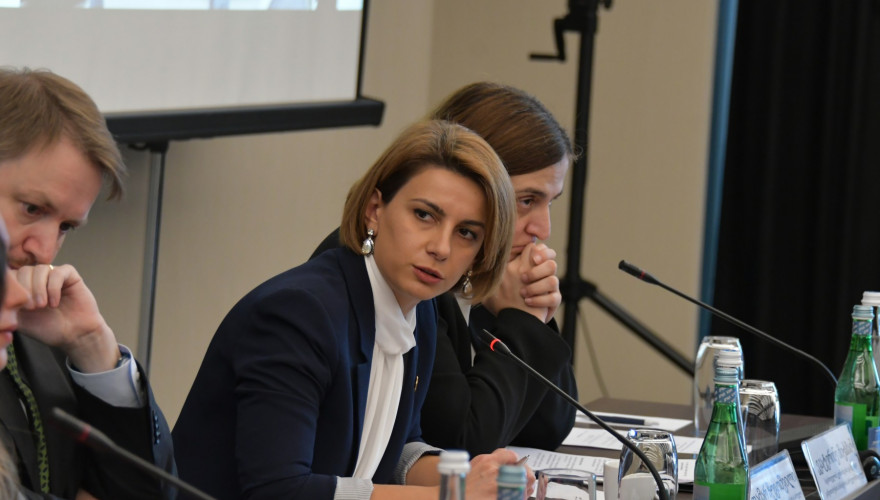Presentation of Reports by Thematic Inquiry Groups of Gender Equality Council

"The Gender Equality Council has unanimously decided to put the complete focal point of the year on women's economic empowerment and we believe this will remain prioritized for the next year as well", - the First Vice-Speaker and Chair of the Gender Equality Council, Tamar Chugoshvili stated at the introduction of reports arranged by Thematic Inquiry Groups set up within the Gender Equality Council.
As per Tamar Chugoshvili, this direction envisages changes and various aspects of work, incorporating those in legislative setting. As the First Vice-Speaker estimated, despite the fact that issues toward this path stay voluminous, tangible advancement is undeniable: problems related with remuneration are being elaborated on, legislation that regulates and prohibits sexual harassment has been passed, significant steps have been taken to handle violence.
In her discourse, Tamar Chugoshvili emphasized the importance of economic empowerment of women and noted that there are obstructions and thwarting components in such manner that put women in fragile economic situation than men. Harping on the mechanism and importance of the inquiry, Tamar Chugoshvili specified the role of Thematic Inquiry as a novel oversight mechanism that is effectively employed by the parliamentary committees and councils so as to perform top to bottom examination of issues and afterward furnish the executive authorities with proper recommendations.
“It is our errand to appropriately recognize what prevents women from accessing these programs and then work with our executive authorities to eliminate these obstructions. Also, we know women who benefit from various government programs. There are, of course, some successful examples, yet there are still numerous hindrances that prevent women from winding up completely engaged with these programs. Thematic inquiries imply that Parliament collects written opinions, evidence, and arguments from all interested parties and then conducts discussions, meetings with those who run the programs themselves or wish to wind up included”, - Tamar Chugoshvili noted.
As indicated by her, the principle objective was not confided to just writing the research and publishing the reports, the primary work starts now with the inquary groups having ideas and suggestions to design approaches to deal with existing problems with the executive authorities.
The results of the Thematic Inquary Reports were presented by the Group Heads.
The Member of the Gender Equality Council and Head of Thematic Inquary Group, Nino Tsilosani, presented the report on “Women's Participation in State Economic Programs”. “Our recommendations are scrutinized and fill in as obligatory not just in light of the fact that they are drafted by the Parliament but also because our country needs them and we all concur it to be so", - Nino Tsilosani noted subsequent to elaborating on the recommendations developed by the Inquiry Group in full compliance with recommendations of organizations working on the international and local women’s rights.
The presentation of the report of the second group - “Accessibility to the Vocational Education for Economic Empowerment of Women” - was presented by the Head of the Group, Member of the Gender Equality Council, Guguli Magradze with a particular spotlight on the on the problematic issues that were identified during the inquary process.
“Education serves as the premise of the economic development and empowerment of women. For the country like Georgia, education is the most important tool we need to overcome poverty. I mean vocational education along with the higher education, on the grounds that the market is demanding for specific professions and, consequently, employment opportunities are available for specific professions”, - Guguli Maghradze noted.
The First Deputy Minister of Economy and Sustainable Development, Ekaterine Mikabadze, Deputy Minister of Environment Protection and Agriculture of Georgia, Nino Tandilashvili, Ambassador of Great Britain to Georgia, Justin McKenzie Smith and the NDI program manager, Teona Kupunia welcomed the presentation audience.
According to the Ministry of Economy, “Only 54% of women are economically active while 75% of men are involved. On the off chance that these figures balance, we will enjoy 11% GDP growth,” which also proves the importance of women's economic empowerment. After the keynote speeches, the meeting continued in a discussion mode.
The audience expressed their views on the issues presented.
Thematic Inquiries are supported by NDI and UK Aid.
